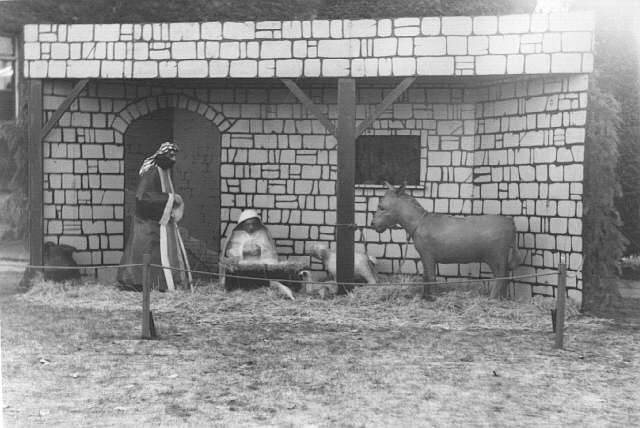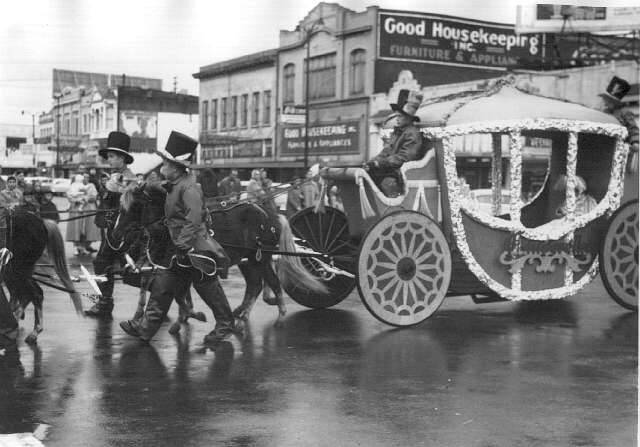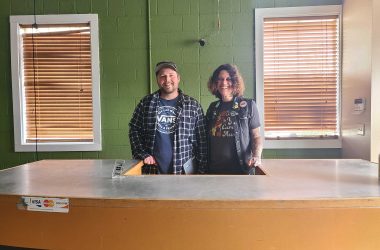This column was originally written for the Willamette Valley Genealogical Society’s publication in a slightly different form and is shared here with permission.
We might assume that early fur trappers traveling to the Oregon Territory celebrated Christmas, but as holidays go, the first Christmas of record in the Oregon Country was a rather dismal affair.
Capt. William Clark, in his idiosyncratic spelling, capitalization and punctuation, gave the details for the “first” at Fort Clatsop on in 1805:
at day light this morning we we[re] awoke by the discharge of the firearm of all our party & a Salute, Shouts and a Song which the whole party joined in under our windows, after which they retired to their room were chearfull all the morning, after brackfast we divided our Tobacco which amounted to 12 carrots one half of which we gave to the men of the party who used tobacco, and to those who doe not use it we make a present of a handkerchief.
The Indians leave us in the evening all the party Snugly fixed in their huts. I recved a pres. of Capt. L. of a fleece hosrie Shirt Draws & Socks, a pr. Mockersons of Whitehouse a small Indian basket of Gutherich, two Dozen white weazils tails of the Indian woman, and some black root of the Indians before their departure. Drewyer informs me that he saw a Snake pass across the parth to day. The day proved Showerey wet and disagreeable. We would have Spent this day the nativity of Christ in feasting, had we anything either to raise our Sperits or even gratify our appetites, our Diner concisted of pore Elk, so much Spoiled that we eate it thro’ necessity, Some Spoiled pounded fish and a few roots.
Despite the dearth of delicacies, drizzly weather and fleas that plagued them day and night, there was at least one development this Christmas day at Fort Clatsop that the men could be grateful for: they now had huts to shelter them from the weather.
Some seven years later a clerk at the infant settlement of Astoria, Gabriel Franchere, reported tersely on the Christmas of 1812:
The 25th Christmas Day, passed very agreeably: we treated the men on that day with the best the establishment afforded. Although that was no great affair, they seemed well satisfied; for they had been restricted during the last few months to a very meager diet, living, as one may say, on sun- dried fish.
The year following–1813–was little better as Astoria was no more. It was now Fort George, property of the North West Company, housing a collection of disgruntled Americans waiting to return home, arrogant Canadians who had taken over the post without firing a shot, French-Canadians who cared little either way and a bunch of bewildered Hawaiians who hardly knew what their fate was to be.
As early as 1812 there had been an outpost established on the Willamette by the Astorians in what is now Marion County. But if any Christmas celebrations occurred here, no one bothered to record them. However, the advantages of the Willamette Valley were becoming well known and when the headquarters of the Canadian fur- athering company moved to Vancouver (following takeover by the Hudson Bay Co.), some longtime employees of the fur companies began to retire and settle in the Valley.
An employee of the American Fur Company, Warren Angus Ferris, recounted the details of Christmas in 1833 at the home of one of these early settlers:
Mine host was Nicholas Montour and Indian wife and family. Christmas was passed agreeably, and we were rather more sumptuously entertained than on normal occasions. Our bill of fare consisted of buffalo tongues, dry buffalo meat, fresh venison, wheat flour cakes, buffalo marrow for butter, sugar, coffee and rum with which we drank a variety of appropriate toasts, suited to the occasion, and our enlarged and elevated sentiments, respecting universal benevolence and prosperity, while our hearts were warmed, our prejudices vanished, and our affection refined by the enlivening contents of the flowing bowl, our bosoms glowed with kindly emotions, peculiar to the occasion.
As more and more American immigrants made their way west, often their first Christmas in the Oregon Country was a far cry from those past celebrations. They usually arrived in the fall, exhausted, hungry, many ill, and their financial resources nearly depleted. They were lucky to have shelter for a holiday celebration. One 1852 immigrant family counted themselves blessed when the father managed to acquire a sack of flour (for $11), some sugar and dried peaches. Their Christmas dinner was topped off with pancakes and syrup for dessert.

George H. Himes, from one of the pioneer Oregon families, recalled a Christmas in the 1850s when Santa Claus had actually remembered him and his sister: in her stocking she received a doughnut doll baby and an apple. Little George’s stocking held a donut and an apple.
Ben Maxwell, in the Dec. 21, 1949 Capital Journal, presented a memoir of two early contrasting Christmases in Salem:
Certainly Christmas was honored and celebrated by the 10 families who resided on the site of Salem 100 years ago. But where and how is not a matter of distinct historical record.
Back in 1849 the population of about 100 persons occupying 16 buildings had no newspapers to record events of the day, and letters from those times are not explicit about what really did happen on Christmas here ten decades ago.
Emigrants lately arrived were often gaunt with hunger, ill from privations and frequently destitute. Such was Tabitha Brown, a courageous and persistent woman, past 60 years of age, who endured unbelievable hardships and suffering on the plains and in the mountainous region of the Oregon country.
When she concluded her long overland journey at the home of a Methodist minister in Salem on Christmas Day of 1846 she had not set foot in a house for nine wearisome months. Her entire wealth consisted of a 6 1/4 cent piece discovered in the finger of an old glove. With this amount she bought needles and undertook sewing. Her determination inspired confidence and her energy founded an orphanage and inspired Pacific University.
Abundance in today’s holiday season exceeds the profusion imagined by any pioneer dreamer hovered about his smoky fireplace in 1849. Luxury food for a big celebration had not yet been imported, and gifts for giving were yet scarce and expensive.
Those with money quickly exhausted the stock in Salem’s only store founded by Uncle Tommy Cox in 1847. In 1848 his business was located in a new, two-story structure on the northeast corner of what is now Commercial and Ferry streets. A plaque marks the site.

During December of 1848, Uncle Tommy sold butter for 20 cents a pound; sugar, two pounds for a quarter; three-quarters of a yard of silk cost $1.50; four pounds of coffee cost $1, and a gallon of molasses sold for six bits.
Come December of 1850, things were different.
Salem then had three if not four stores, and merchandise was available for all with money to spend. Butter then sold for 50 cents a pound, eggs for four bits a dozen and potatoes cost $1.50 a bushel.
Cox stayed open on Christmas Day that year and when Mr. L. Rector came in he paid $1.35 for three pounds of one variety of apples and $2.25 for five pounds of another. Though exotic luxuries for Christmas giving were yet in the future, Uncle Tommy in December of 1850 could supply port wine at $3 a bottle, and we can be pretty sure that the $10 Dr. W.H. Willson paid for a crepe shawl was Chloe Willson’s Christmas present.
In 1899, Salem had a population of 4,200. Rails of steel spanned the continent and immediate communication with any part of the world could be accomplished in Salem.
Even so, the approach of Christmas 50 years ago got no front page headlines in the Capital Journal. Late in December of 1899, headline news told about the wobbly gold standard, the Spanish-American war and the deplorable plight of local hop growers. A near Christmas editorial declared Uncle Sam could make all mankind a very pretty Christmas gift by calling a halt to the South African war.
Advertisers coyly hinted that Christmas was near at hand. Yokahama Tea store suggested dishes. J.J. Dalrymple & Co. offered handkerchiefs from 5 cents to $3. Buren & Hamilton at 248 Commercial St. called attention to their carpet sweepers. S.W. Thompson and G.H. Hinges praised their jewelry. Jos. Meyers & Sons, “Salem’s greatest Store,” were having a special on imported novelties. Chung Lee Co. in the Cottle block on North Commercial street offered a line of Chinese and Japanese fancy goods for the holiday trade.
In 1899, Christmas came on Monday.
Stores remained open late on Saturday evening to supply late shoppers on that mild, balmy night. Stores were crowded. That year in December, just as in 1849, gold, this time from Alaska, was dissipating a gloomy depression. “Innumerable private trees,” says the Capital Journal, “were set up and loaded with presents, and the camera fiends were in their glory.”

On Christmas Day things were quiet in Salem. A single wagon load of lumber rumbling down Commercial Street drew considerable comment and, says the paper, “gave a distinct shock as though it were a sacrilege.”
Everything was quiet in Salem on Christmas except at the post office. The office remained open and a reporter noted that it was crowded to overflowing as though everyone expected a Christmas present by mail and was on hand to get it. And the scribe continued: “a girl who didn’t like to be squeezed had no business there.”
Churches were open, too, and well attended. But those who did not care to go to church had another alternative. “Human Hearts,” Idyl of the Arkansas Hills, was playing at Reed’s Opera house. Patton Brothers, who managed the theater, were offering choice seats in the first balcony for 75 cents and a less ostentatious location in the gallery for two bits.
STORY TIP OR IDEA? Send an email to Salem Reporter’s news team: [email protected].
JUST THE FACTS, FOR SALEM – We report on your community with care and depth, fairness and accuracy. Get local news that matters to you. Subscribe to Salem Reporter. Click I want to subscribe!









